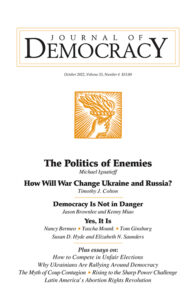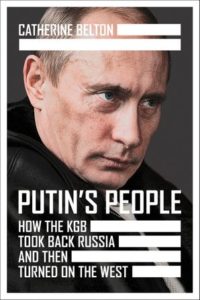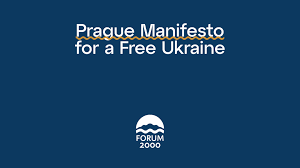The cost of Russia’s military mobilization and the impact of Western sanctions are set to blow a hole in the government’s budget forecasts and drain Moscow’s reserves to their lowest level in years, according to analysts’ latest calculations. That will put an ever greater strain on the Kremlin’s resources as President Vladimir Putin seeks to fund a conflict with no end in sight and prepares for a possible re-election bid in 2024, Reuters reports.
Russia is heading toward an historic defeat in Ukraine that will have profound ramifications for the way Russians view their state and themselves, says Taras Kuzio, a professor of political science at the National University of Kyiv Mohyla Academy and author of the forthcoming book “Fascism and Genocide. Russia’s War Against Ukrainians.”
 Defeat in Ukraine will undermine the imperial identity that defines Putin’s Russia, he writes for the Atlantic Council. It will force the Russian public to belatedly confront decades of nationalistic myth-making by their own rapacious elites. It is still far too early to predict what kind of Russia will emerge from the wreckage of Putin’s Ukraine invasion, but it already looks unlikely that anyone will continue to view the country as one of the world’s superpowers, adds Kuzio, a contributor to the NED’s Journal of Democracy.
Defeat in Ukraine will undermine the imperial identity that defines Putin’s Russia, he writes for the Atlantic Council. It will force the Russian public to belatedly confront decades of nationalistic myth-making by their own rapacious elites. It is still far too early to predict what kind of Russia will emerge from the wreckage of Putin’s Ukraine invasion, but it already looks unlikely that anyone will continue to view the country as one of the world’s superpowers, adds Kuzio, a contributor to the NED’s Journal of Democracy.
Every “rational” case for why Putin won’t use nuclear weapons in Ukraine falls short, says analyst Masha Gessen. He is not afraid of losing support from his current allies, because he misapprehends Russia’s position in the world; he sees Russia as politically, economically, and militarily stronger than it is, she writes for the New Yorker:
Chinese and Indian leaders may express alarm at the use of extreme measures such as nuclear weapons, but to Putin this points to their lack of resolve—their weakness, not the Kremlin’s. And, if need be, he is prepared to make outlandish denials, no matter how implausible. Russian propagandists have argued that the Malaysian airliner shot down over eastern Ukraine in 2015 was packed with corpses by bad actors trying to frame Russia and that the scenes of war crimes in Bucha were “staged.”
 A conflict that had been about the future of Ukraine has become for Mr. Putin an existential struggle for the future of Russia, and he is raising the stakes and backing himself into a corner, argues a professor of international affairs at Georgetown University and a senior fellow at the Council on Foreign Relations.
A conflict that had been about the future of Ukraine has become for Mr. Putin an existential struggle for the future of Russia, and he is raising the stakes and backing himself into a corner, argues a professor of international affairs at Georgetown University and a senior fellow at the Council on Foreign Relations.
The mounting risks that the West faces in Ukraine necessitate that the United States and its NATO partners get more involved in managing the war and in setting the table for an endgame, he writes for the Times. From Vietnam to Afghanistan to Iraq, the United States has gotten in over its head, taking on strategic commitments not warranted by the interests at stake. Helping Ukraine defend itself is worth a quite significant effort, but not one that leads to World War III or fractures Western democracy.
 Negotiations in themselves are neither a sell out nor solution, National Endowment for Democracy (NED) board member Daniel Fried tweeted today. Negotiations that start by accepting Russia’s terms are dumb, considering that Russia is not winning. It is not for the US to offer concessions or signal desperation for talks.
Negotiations in themselves are neither a sell out nor solution, National Endowment for Democracy (NED) board member Daniel Fried tweeted today. Negotiations that start by accepting Russia’s terms are dumb, considering that Russia is not winning. It is not for the US to offer concessions or signal desperation for talks.
Lithuania this week hosted the inaugural meeting of the International Expert Network Russia. Organized by the Lithuanian parliamentary Committee on Foreign Affairs and the Center for Liberal Modernity, the group aims to contribute to updating the European and transatlantic strategy against Russia.
If democracy could be dismantled in Russia, it can be dismantled in other countries, even if their institutions are more mature, a new film (above) suggests.
 The Kremlin’s invasion of Ukraine has sparked curiosity in the West about what happened in Russia over the past thirty years to make this war possible, Carnegie Politika’s Georgy Birger writes. The BBC rose to the challenge, releasing a vast archive of footage filmed in post-Soviet states. Adam Curtis has turned it into a seven-part series, Russia 1985–1999: TraumaZone. Diving into the economic, social, and political state of Russia in those years, the series challenges Western perceptions of the post-Soviet era.
The Kremlin’s invasion of Ukraine has sparked curiosity in the West about what happened in Russia over the past thirty years to make this war possible, Carnegie Politika’s Georgy Birger writes. The BBC rose to the challenge, releasing a vast archive of footage filmed in post-Soviet states. Adam Curtis has turned it into a seven-part series, Russia 1985–1999: TraumaZone. Diving into the economic, social, and political state of Russia in those years, the series challenges Western perceptions of the post-Soviet era.
Russia is trying to cast the Ukraine war as a conflict between the West and an ill-defined ‘Global Majority.’
The crisis did not start in 2022, it started in the mid-1990s – just as the Second World War really began with the post-First World War Treaty of Versailles, which was unfair and laid the foundations for what later transpired, according to Professor Sergey Karaganov, honorary chairman of Russia’s Council on Foreign and Defense Policy.
Almost three decades ago, the West refused to strike a just arrangement with post-Soviet Russia, he told last week’s Valdai Forum. Instead, as it seemed to many at the time, it created a new domination system based on so-called “rules” – global liberal imperialism.
Meet some of the defiant Russians pushing back against President Vladimir Putin’s crackdown on critics of the war in Ukraine. (below), as FRONTLINE tells the inside stories of activists and journalists risking arrest and imprisonment to protest and speak out about the Kremlin’s war effort.







